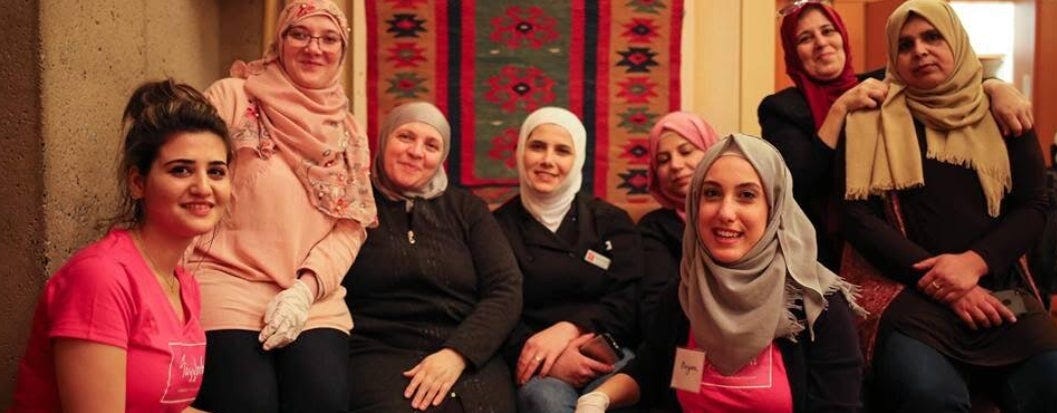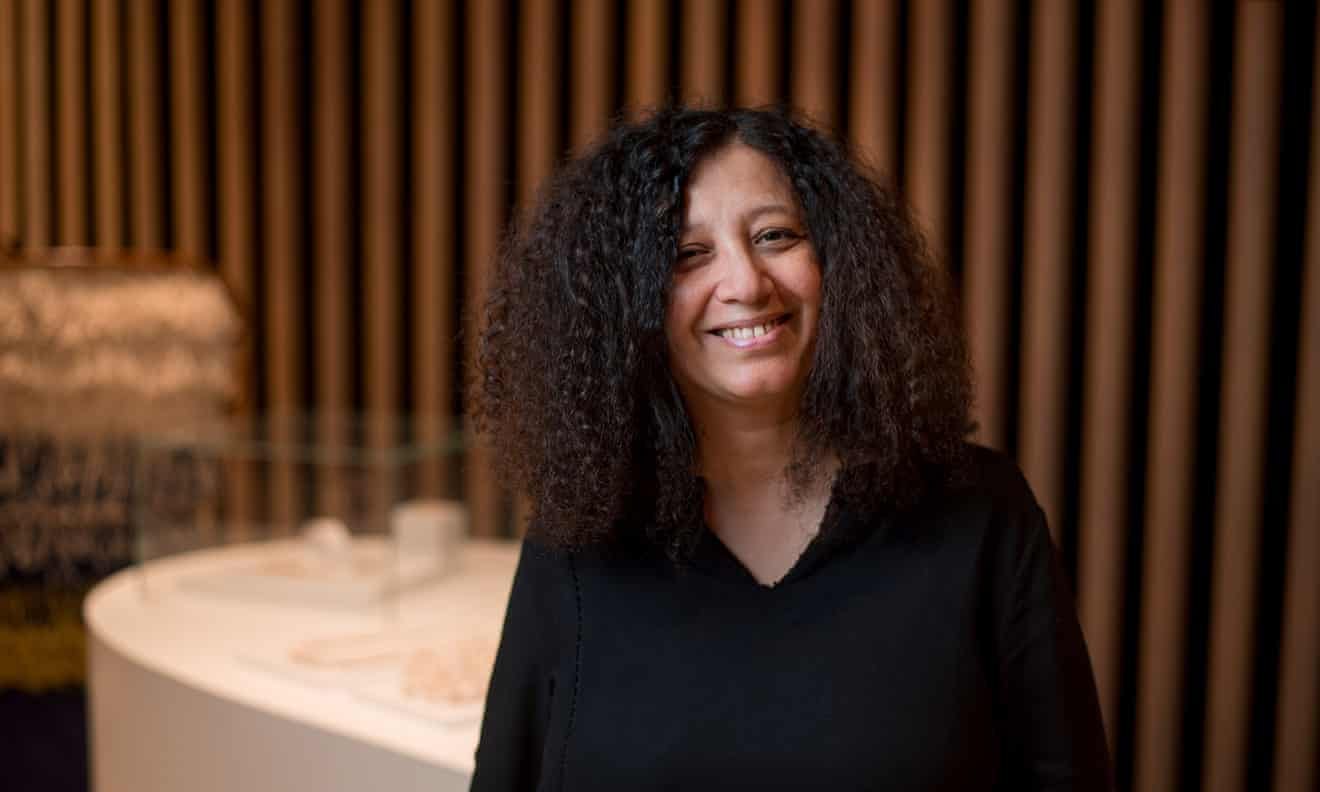Global Roundup: Afghan Singing Sisters, Women-Run Syrian Restaurant, Moroccan Palm Husks Art, Utah Multicultural Fashion Show, Asia-Pacific Feminist School
Curated by FG Contributor Inaara Merani
The sisters became a social media phenomenon. Here, recording one of their latest songs. Kawoon Khamoosh. (BBC)
When the Taliban returned to power in Afghanistan in August 2021, it took less than 20 days to implement their vision, a vision which has stripped Afghan women of their rights. Two sisters in Kabul felt compelled to use their voices speaking out against this oppressive regime.
Using social media, Shaqayeq and Mashal (pseudonyms that the sisters use) began a singing movement and quickly became a musical phenomenon and a symbol of resistance, despite not having any background in music. Going by the name "The Last Torch”, the duo released their first song just days after the Taliban takeover.
That's why we decided to call ourselves the Last Torch. Thinking that we wouldn't be able to go anywhere, we decided to start a secret protest from home. – Shaqayeq, the younger sister of the musical group
The Last Torch has since released a number of other songs, all sung while wearing blue burqas. One of the songs was a rendition of a poem by the late Nadia Anjuman, who wrote it in protest against the first Taliban takeover in 1996. Anjuman and her friends used to meet at an underground school, The Golden Needle, where they would pretend to sew but would read books instead.
Last year, Shaqayeq and Mashal chose to leave Afghanistan for their safety. They have received threats online and were living in fear that one day, the Taliban would figure out their identities. The sisters are hopeful that they will return home soon, but in the meantime, they are continuing their musical activism and fighting for the rights of all Afghan women.
These poems are just a small part of the grief and pain we have in our hearts. The pain and struggle of the people of Afghanistan, and the grief they have endured under the Taliban in the last years, can't fit in any poem. Our voice won't be silenced. We are not tired. It's just the beginning of our fight. – Mashal, older sister of the duo
Tayybeh was created in 2017 as a social enterprise which hosted pop-up Syrian dinners across Vancouver, Canada, made exclusively by a culinary team of Middle Eastern refugee women. What started as a pop-up kitchen became a catering company, and is now a full meal-service enterprise.
The word "tayybeh" means both "kind" and "delicious" in Arabic. The company has employed over 20 refugee women from the Middle East, most of whom are from Syria. Nihal Elwan, the founder of Tayybeh, says the purpose of this initiative was to support refugee women who face barriers to employment in Canada for a number of reasons including lack of English and lack of relevant professional work experience. Elwan says that many of the women that arrived in Canada were stay-at-home moms or homemakers, and did not have "real" work experience aside from cooking.
The women working at Tayybeh have said that making these Syrian foods and serving them to the larger community makes them feel closer to home, and that they are connected to one another by language, country, and food.
Now, the Tayybeh enterprise has opened its first cafe located in the Kitsilano area of Vancouver, serving home-cooked, traditional Syrian delicacies such as chicken Shawarma, kebab, kibbeh, and samboosak. Elwan is motivated to open more Tayybeh locations in the future in order to support more refugee women, and to live up to the “Tayybeh” name.
Amina Agueznay, who trained and practised as an architect before turning to art, says: ‘I can’t hug my buildings, but I can hug my artwork.’ Photograph: Hazem Treasure. (The Guardian)
Amina Agueznay recently won the Norval Sovereign African art prize, worth $35,000 USD, for her work in creating art using palm husks. In addition to the prize money, Agueznay will be awarded a solo exhibition at the Norman Foundation art museum in Cape Town and an artist’s residency in London, supported by the Outset Contemporary Art Fund.
Agueznay says the idea to use palm husks came to her during a workshop she led in the Souss-Massa region of Morocco, as part of a project to renovate Tissekmoudine, a ksar (or fortified village). Fortified villages are found across Maghreb, and are made of stone and adobe with palm grove gardens. Although some villages are ruined, many are now being renovated as part of a push to preserve Morocco’s cultural heritage.
Her work in Tissekmoudine inspired her work; the artist had planned to use palm trees in her designs and encouraged women to look around and find whatever materials were around. The team decided to weave with palm husk, known as “talefdamt” in the Amazigh language.
Portal #1, the winning art piece, mimics a jagged-edge motif that can be found on Moroccan rugs and the symbols painted onto the door of a ksar. Agueznay says she drew a door and then asked six women to weave a design for her. The artist, who is known for collaborating with rural craftworkers and documenting their designs and traditions, says she feels blessed by the win.
This prize is an encouragement and the will to continue, empowering women that I work with. I lead workshops throughout Morocco and what happens is that I always go back. There is a continuity, and continuity is very important to me – what we call la pérennité [sustainability]. – Amina Agueznay
Fathom from Somalia dances on the runway during the Women of the World annual fashion show on Wednesday, March 6, 2024. (Rick Egan | The Salt Lake Tribune)
The 14th annual refugee women’s multicultural fashion show and gala was recently hosted by Women of the World, a nonprofit from Utah, which supports refugee women. Women from 20 countries were represented at the show last week, celebrating their stories.
Founded by Samira Harnish, Women of the World was created to support women seeking employment but encountering difficulty due to prejudice and discrimination for wearing traditional clothing. The first show was held in 2010 to celebrate International Women’s Day, and as a reminder to everyone to embrace your heritage regardless of the response. The fashion show used to take place in the streets until it moved into smaller venues and eventually the venue from this year which sat 500 people.
Women from Rwanda, Colombia, Nepal, Iraq, Yemen, Mexico, Venezuela, Afghanistan, Somalia, Uganda, Sudan, Syria, Malaysia, Ethiopia, Rwanda, Democratic Republic of the Congo, Peru, and Ukraine were represented. Overall, more than $30,000 was fundraised for the organization and to continue supporting refugee women in Utah.
As each model walked the runway in their traditional clothing, there was an audio clip playing which explained their journey and why Women of the World matters to them. Many of the women danced down the catwalk, while others walked down, however, everyone had a beaming smile on their face.
When you see each participant walking down the runway tonight consider the incredible journey they have undertaken, fleeing violence and oppression, leaving behind a comfortable job, lives and families hoping only for a safe night’s sleep … their beauty stems not just from their features and clothing, but from their strength and courage in seeking a better life here in Utah. – Samira Harnish
(UNAIDS)
One-third of people living with HIV in Asia and the Pacific are women, however their issues are often hidden due to gender-based violence, restricted economic opportunities, child marriage, underage pregnancy, denial of property rights, and more. A UNAIDS-supported initiative by the International Community of Women Living with HIV Asia and Pacific (ICWAP) is supporting positive women’s organizing at the Feminist School which has been used in Asia-Pacific since 2016.
The Feminist School is anchored in feminist principles, specifically designed to support and enable women living with HIV to understand their own experiences, locate these experiences politically, and then develop strategies for community-driven advocacy.
Marching in the month of March is not enough to realize women’s rights. We need to speak up on the issue of gender inequality in the HIV response and the need for increased investments in women and girls. Women and girls living with HIV are going through serious human rights violations that, in turn, undermine their right to health. – Sita Shahi, ICWAP Regional Director
The Feminist School strives to bring together women living with HIV, women from key populations, and young women from across the region. Some of the modules that are taught at the school include sexual and reproductive health and rights, movement building, leadership skills training, and the elimination of mother-to-child-transmission of HIV.
Recently, the Feminist School partnered with a number of Asia-Pacific women’s organizations to help identify priority issues for advocacy, as well as recommendations and country-specific advocacy plans. This was carried out through another UNAIDS-supported strategy to boost engagement and to roll out an online training program. Here, women received training on their country’s gender equality strategy, including the gender equality markers (GEM), as well as support on how to hold their government’s accountable.
The Feminist School is equipping numerous women across the Asia-Pacific with the knowledge and technical skills to challenge their societies and government and push for more inclusive policies for women living with HIV. The main priority of the school is to protect women’s health, women’s leadership, and women’s rights.
Inaara Merani (she/her) recently completed her Masters degree at the University of Western Ontario, studying Gender, Sexuality, and Women’s Studies with a specialization in Transitional Justice. In the upcoming years, she hopes to attend law school, focusing her career in human rights law.
Inaara is deeply passionate about dismantling patriarchal institutions to ensure women and other marginalized populations have safe and equal access to their rights. She believes in the power of knowledge and learning from others, and hopes to continue to learn from others throughout her career.






